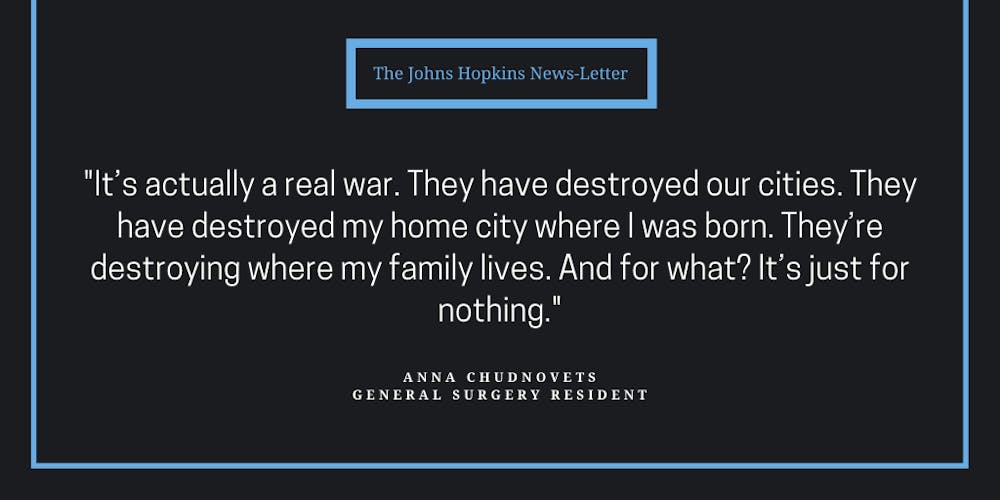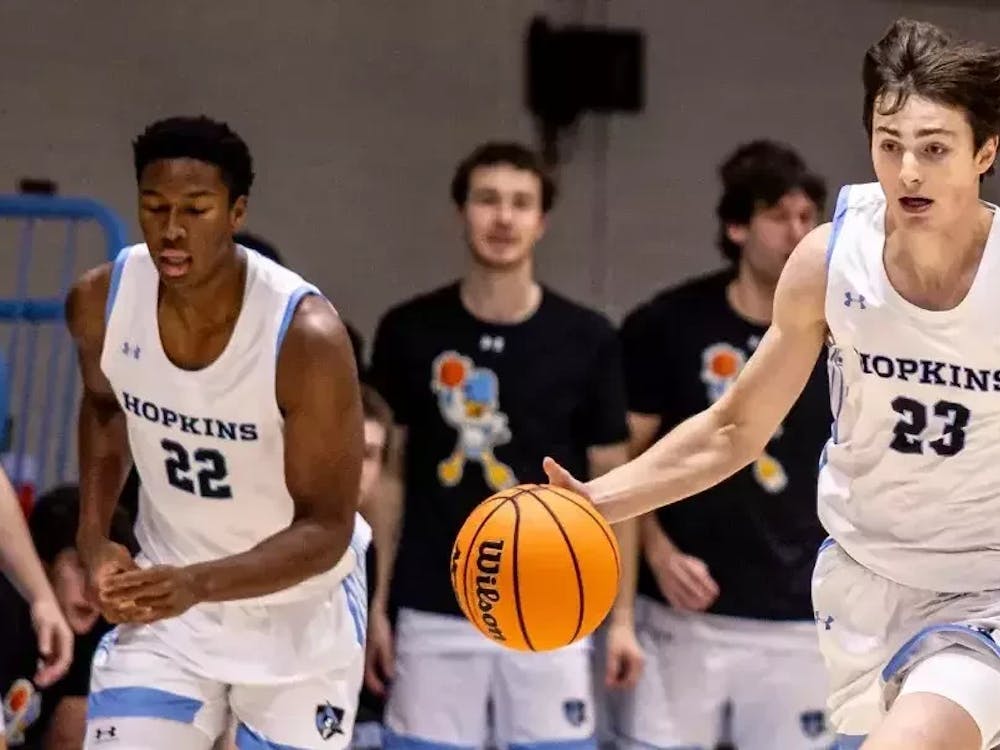President Vladimir Putin of the Russian Federation initiated a full-scale invasion of Ukraine in an effort to force Ukraine into the Russian sphere of influence on Feb. 24, local time. Since Feb. 24, thousands in Ukraine have been killed and at least 2 million Ukrainians have fled their country.
In interviews with The News-Letter, Ukrainian and Russian members of the Hopkins community reflected on how they and their friends and family have been affected.
Family and friends in a war zone
Dr. Anna Chudnovets, a general surgery resident who was born in Zaporizhia, Ukraine but whose family later moved to Irpin, described how she learned about the beginning of the war.
“When the war started, here it was Wednesday night. I just was going in the Uber [from work] and I opened Facebook and I saw the war had started,” she said. “I tried to call my family and they told me they were walking out because there were very loud sounds. It was like bombs from outside that were exploding.”
She detailed how her family packed up their necessary belongings within one hour and drove 27 hours nonstop to flee to western Ukraine. They decided not to cross the border due to the long lines and her mother wanting to stay with Chudnovets’ father, as Ukrainian men aged 18 to 60 are forbidden to leave.
Associate Professor at the School of Advanced International Studies (SAIS) Eugene Finkel, who was born and raised in Lviv, Ukraine, described how people he knew were being affected in an email to The News-Letter.
“Several of my childhood friends are still in Ukraine. My parents' friends are also there. They are mostly in western Ukraine, which is as of now still relatively safe — there were several missile attacks and that's it,” he wrote. “A number of academics I know very well and have close professional relations with are in Kyiv, the capital. They are under constant artillery bombardment but are determined to stay.”
In an interview with The News-Letter, senior Diana Bershadsky, whose parents were born in Ukraine, pointed out the dilemma that many Ukrainians face when deciding whether to leave.
“It’s a really difficult decision to leave everything and not know when you’re going to get back,” she said. “Yes, school is being disrupted, businesses are being disrupted, but it’s an altogether different thing when you just pack up as much as you can and leave.”
Andrey Beregovskiy, a Muscovite Russian graduate student with ties to Ukraine and Russia, recounted how having relatives on both sides of the war has affected him.
“We are very close nations. We are like brother nations. Seeing this war of course has been a lot more painful knowing that— it’s almost like a civil war for me,” he said. “I want to stress ‘almost” because obviously Ukraine is a nation of its own with a rich history and culture.”
The role of misinformation
Chudnovets pointed out how misinformation crafted by the Putin regime has obscured the true nature of the conflict to Russian citizens.
“They think it’s a ‘special military operation’ to help the Ukrainian people,” she said. “It’s actually a real war. They have destroyed our cities. They have destroyed my home city where I was born. They’re destroying where my family lives. And for what? It’s just for nothing.”
She remarked that many of Putin’s purported reasons for the war, such as demilitarizing Ukraine and removing Nazis from the country, have no basis in reality and argued against Putin’s claims that Ukrainians and Russians are a single people.
“We are an independent country. We are different from Russians,” she said. “We may speak Russian as well, but we are a completely different nation. We have different goals, we think differently.”
Beregovskiy described the sophisticated nature of Russian state propaganda in an interview with The News-Letter.
“Even I, who have held liberal views for as long as I could remember, once I watched one hour of Russian TV and I started to think, ‘Oh wait, that actually starts to make sense,’” he said. “One hour: That’s all it takes to get to the seed in your head that starts growing.”
Ukrainian mobilization
Despite the strength and numbers of the Russian military, Chudnovets observed that many of the people she knew back home were trying to help out in any way they could.
“Everybody else I know is trying to help any way they can,” she said. “The men, if they can, go to the military. People who are not accepted try to volunteer to work out supplies and food.”
She highlighted how the Ukrainian president, Volodymyr Zelenskyy, has decided not to flee the capital despite the immense risk to his life. She expressed admiration for the bravery and courage of Ukrainian soldiers.
Bershadsky highlighted how for many Ukrainians, the war has already been going for some time now.
“I know that a few members of my mom’s side of the family are in the reserves and they were already fighting because the war started in 2014, when Crimea was annexed,” she said. “That was the first, I guess, ‘pawn move’ of the war Russia started chipping away at Ukrainian sovereignty bit by bit.”
Beregovskiy commented on some of the motivations for Putin commencing the invasion.
“[The Ukrainians] have such a unique spirit and will for personal and political freedom that they cannot accept autocratic rule. Putin knows that very, very well,” he said. “This war was his attempt to break this spirit once and for all.This war is basically him trying to stay in history, trying to make his mark in Russian history. He sees this mark as the revival of a grand Russian Empire.”
He expressed concern that Putin’s choice to invade Ukraine could have dire consequences for Russia, as the fallout of the war undermines Moscow’s authority. He worried that this could then lead to regional and ethnic grievances rising to the surface and sparking violence.
Supporting from Baltimore
Finkel drew attention to donation efforts that students at Hopkins can use to help those affected by the war.
“Our students at the SAIS Europe campus are raising funds and buying goods Ukrainians need the most now: medicine, bandages, canned food, sugar, baby food and more,” he wrote. “It is much easier to ship things to Ukraine from Italy than from the United States. If you reach out to them, they could use donations to buy these things.”
Finkel recommended people in the U.S. to donate to humanitarian relief organizations and pressure their representatives to help Ukraine out more. He also suggested that the University assist Ukrainian students financially and mentally and welcome scholars and students from Ukraine to continue their studies here in the United States.
Chudnovets stated that medical supply donations, which she has been helping with, from the University would be useful. She also noted that there are a variety of ways individuals can help.
“Even if people share the truth, some links on social media, it’s helpful. There are sites with fundraisers. There’s a separate link for the army,” she said. “If somebody has the opportunity to help with supplies, that’s helpful. Any help that we can get, we’re very grateful for.”
In an email to The News-Letter, Vice President for Communications Andrew Green described that the University, in conjunction with the University of Maryland Medical System, has sent $4 million in medical supplies to Ukraine. He added that the Office of International Services has directed mental health support and other resources to Ukrainian students.
The Office of Student and Health Well-Being has resources for those affected seeking assistance and support.
The Homewood Campus Student Government Association, Homewood Campus Graduate Representative Organization, School of Medicine Graduate Student Association, School of Public Health Student Assembly and School of Nursing PhD Student Organization compliled a list of organizations to donate to.





